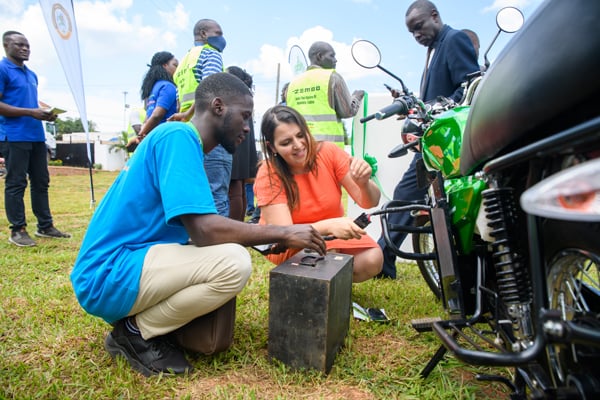Prime
Govt seeks to introduce 140,000 e-bikes in Uganda in next five years

Government has already partnered with different organisations to establish e-bikes and create e0mobility infrastructure in different parts of the country. Photo / File
What you need to know:
- Government views the shift to e-bikes as a move that will support greening Kampala and other parts of Uganda.
Government has signed a five-year agreement in which it will seek to replace more than 140,000 combustion-engine motorbikes in Kampala with electric alternatives.
In a statement released on Monday, government indicated the move seeks to reduce emissions from motorbike taxis, also known as “boda-bodas” in Kampala, which account for one-third of Uganda’s official fleet.
The agreement comes at a time when much of Africa is attracting an increase in e-mobility activity.
Mr Edward Katumba Wamala, the Works and Transport Minister, said e-bikes will be a positive step towards greening Uganda and improving air quality.
“Many countries are adopting policies on clean energy, and Uganda cannot be left behind,” he said in the statement.
The agreement, which was signed between government and Spiro, formerly known as M Auto, will also see Spiro establish 3,000 swapping and charging stations and an e-bike assembly plant.
Mr Shegun Adjadi Bakari, the Spiro chief executive officer, said verified boda boda riders in Uganda will be able to exchange combustion engine motorbikes with electric ones.
Spiro hopes to make money from the project through charging batteries at its stations. Boda bodas have emerged as the primary alternative in bad terrain, heavy traffic, and narrow corridors in Uganda and other countries, with room to expand.
Government views the shift to e-bikes as a move that will support greening Kampala and other parts of Uganda.
The transition is part of Uganda’s larger energy transition plan in a bid to control carbon emissions.
The Energy Ministry has already reviewed the energy policy to include emerging global trends such as e-mobility offering guidance on electric mobility charging ecosystem and how it can be developed.
Last year, the Ministry of Energy in partnership with GIZ and Zembo, a private company launched a pilot scheme that would put in place motorcycle charging infrastructure.
Already, three solar powered charging stations in Mpigi, Buwama, Lukaya and Masaka have been established under the One City project covering the Kampala – Masaka highway.
However, despite the government’s strategic approach, there are concerns about the nation’s electrical infrastructure’s ability to support industrialization and the charging of electric vehicles at the same time.




